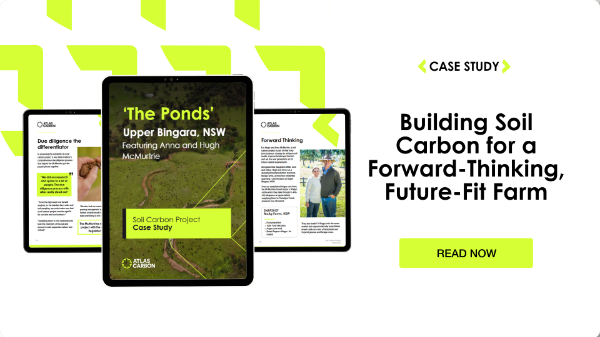Atlas Live: What makes a soil carbon project work?
Watch the replay on demand!
Are you interested in understanding the critical components that contribute to the success of soil carbon projects? Whether you're a grazier, farm owner, or simply curious about livestock management, this webinar is designed for you!
Summary
Prioritizing Productivity in Soil Carbon Projects
Victoria Lawrence and Amanda Young from Atlas Carbon and MaiaGrazing, emphasise that productivity must take precedence in soil carbon projects, with carbon credits serving as a beneficial bonus.
Essential Factors for Successful Carbon Sequestration
Key to project success is soil quality, particularly cracking black clays (vertisols) that store carbon effectively. While 800 hectares is the typical minimum scale, various soil types can work if adequately managed. Rainfall of about 500 mm annually is crucial for biomass growth needed for carbon capture.
The Role of Grazing Management
Effective grazing management is critical, contributing to over 90% of successful projects. Improvements often involve creating smaller paddocks and optimizing stock density for more intensive grazing practices. Additionality—demonstrable improvements over existing practices—is a requirement for government support.
Atlas Carbon’s Three-Step Process
Atlas Carbon follows a streamlined three-step process:
1. Free Desktop Cost-Benefit Analysis: Initial assessment to evaluate potential benefits.
2. On-Farm Visit and Soil Testing: Farm visits provide extensive soil testing, revealing property insights.
3. Project Viability Assessment: A thorough evaluation ensures the project's financial sense over a long term partnership.
Commitment to Transparency and Support
Atlas Carbon’s transparent approach and realistic expectations are supported by MaiaGrazing’s extensive data. Successful projects depend on the right mix of soil, rainfall, and management practices, all backed by thorough due diligence and ongoing technological assistance. By focusing on these elements, farmers can bring productive and sustainable soil carbon initiatives to life.
Download the McMurtrie case study to learn how a soil carbon project can empower your farm to be a thriving, future-focused business.



.png)
.png)
.png)
